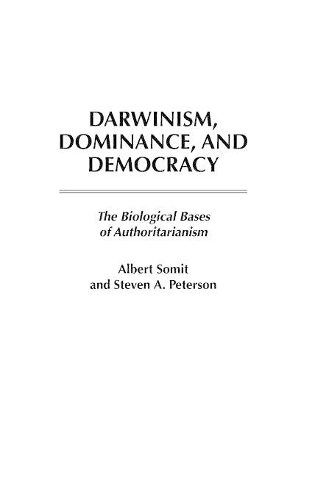
Darwinism, Dominance, and Democracy: The Biological Bases of Authoritarianism
(Hardback)
Publishing Details
Darwinism, Dominance, and Democracy: The Biological Bases of Authoritarianism
By (Author) Steven Peterson
By (author) Albert Somit
Bloomsbury Publishing PLC
Praeger Publishers Inc
25th March 1997
United States
Classifications
Tertiary Education
Non Fiction
Political ideologies and movements
320.53
Physical Properties
Hardback
160
Width 156mm, Height 235mm
340g
Description
Somit and Peterson seek to explain two apparently contradictory yet well-established political phenomena: first, throughout human history, the vast majority of political societies have been authoritarian. Second, notwithstanding this pattern, from time to time, democracies do emerge and some even have considerable stability. A neo-Darwinian approach can help make sense of these observations. Humans - social primates - have an inborn bias toward authoritarian life, based on their tendency to engage in dominance behaviour and the formation of dominance hierachies. Reinforcing this is an impulse toward obedience. These factors are associated with the propensity of humans to accept authoritarian systems. Nonetheless, the authors argue, conditions of material abundance combined with another human characteristic - indoctrinability - can foster the emergence and maintenance of democracies. Somit and Peterson assert that an understanding of "human nature" form an evolutionary perspective can help to explain how and why political systems have developed. They conclude by pointing to policy implications that might enhance the odds of formation and continuation of democratic forms of government.
Reviews
"[A]n intrepid but compassionate study of the political dilemmas stimulated by the hierarchical regularities of human groups. It is also responsibly passionate about getting the scholarship right, the interpretation honest, and the implications unfancifully clear. This volume should be a firm part of curricula on democracy, the history of political theory, and on human nature."-Lionel Tiger Rutgers University
"Albert Somit and Steven Peterson have the distinction of having remained mainstream while becoming leaders in the biopolitical movement."-Jean Laponce Department of Political Science The University of British Columbia Coeditor, the International Political Science Review
"Somit and Peterson have produced an intriguing and provocative account of the limits of democracy.... [T]hey provide a challenge to democratic theory that is of tremendous pedagogical use.... It poses issues that should engage theorists and advanced students, but it is written at a level that is accessible to undergraduate courses [as well]."-Meredith W. Watts Professor, Political Science University of Wisconsin-Milwaukee
"Somit and Peterson provide an informative account of the evolutionary basis for our historical (and current) opposition to democracy. For many, this will be an unwelcome message--like being told that one's fly is unzipped. But after a brief bout of anger, we tend to thank the messenger for sparing us further embarrassment."-Robert E. Lane Professor Emeritus of Political Science, Yale University Past President, American Political Science Association
"This is a bold and forceful attempt to state clearly and without needless technicality the problem democracy faces in surviving, not against totalitarian foes, but against its own inherent incompatibility with our evolved emotional and cognitive natures.... [A]n excellent, well-argued, well-documented and courageous effort to face ideologically unpalatable facts with a dose of scientific realism."-Robin Fox University Professor of Social Theory Rutgers University
"While addressed primarily to students of Comparative Politics, this study has crucial implications for those of us in the field of international and global politics. Systematically summarizing the research findings in evolutionary biology and brilliantly bringing them to bear on the problems of human governance, the authors inadvertently reveal the naivete of the current enthusiasm for the 'democratic peace' doctrine.... This book is, further, a powerful refutation of today's triumphalists."-J. David Singer Department of Political Science University of Michigan
Somit and Peterson assert that natural selection and genetic development created a human tendency for dominance, submission, hierarchy, and obedience, as opposed to equality and democracy.... They challenge facile hopes for expanding democracy but do not write democracy off.... their belief thhat 'civic indoctrination' can instill the values and practices of democracy deserves consideration.... The authors enrich debate about democracy...-Choice
This short book is essentially a literature review of the major scholarship and generalizations in the field....Most scholars in the fields of politics and life science will be familiar with literature and the line of argument presented by the authors. More likely, this book would be of interest to a general audience and students who seek an introduction to some of the research and debate in the field of biopolitics.-Perspectives of Political Science
"Somit and Peterson assert that natural selection and genetic development created a human tendency for dominance, submission, hierarchy, and obedience, as opposed to equality and democracy.... They challenge facile hopes for expanding democracy but do not write democracy off.... their belief thhat 'civic indoctrination' can instill the values and practices of democracy deserves consideration.... The authors enrich debate about democracy..."-Choice
"This short book is essentially a literature review of the major scholarship and generalizations in the field....Most scholars in the fields of politics and life science will be familiar with literature and the line of argument presented by the authors. More likely, this book would be of interest to a general audience and students who seek an introduction to some of the research and debate in the field of biopolitics."-Perspectives of Political Science
Author Bio
ALBERT SOMIT is Distinguished Service Professor Emeritus at Southern Illinois University. He has served as Executive Vice-President of the State University of New York at Buffalo and as President of Southern Illinois University. He is one of the earliest pioneers in the field of biology and politics and the founder of the International Political Science Association Research Committee #12 (Biology and Politics). STEVEN A. PETERSON is Professor in the School of Public Affairs at Penn State Harrisburg. He has been active in the Association for Politics and the Life Sciences and Research Committee #12, and has written extensively on biology and politics. Together they have coauthored several works including The Dynamics of Evolution and Biopolitics and the Mainstream.
